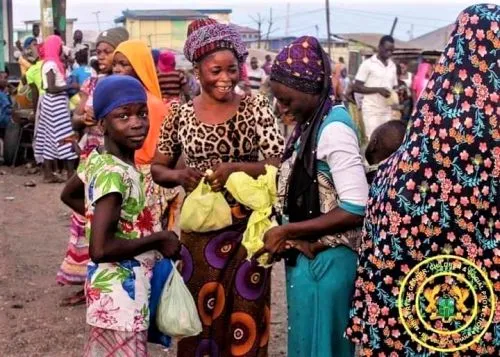Can COVID-19 offer lessons for governments to address biodiversity loss?
This blog post was written by: Abdul W. Arimiyaw, Ambrosse B. Kenneh & Abdoulaye D. Diallo*
Lockdown interventions have become a crucial component of public health measures to curtail the rapid spread of the novel coronavirus. In many West African countries, the identification of community hotspots of COVID-19 infections certainly justifies the decision to restrict movement in these areas, which are mainly urban or sub-urban. To most governments, the implementation of lockdown measures is an effort to avoid frequent contact between people, as social distancing clearly helps slow down the spread of the virus. It is therefore expected that these preventive measures will mitigate the spread of the outbreak and ultimately reduce the number of people affected.
Environmental health: who cares?
Although the lockdown measures reveal overwhelming concern for human lives, the speed with which governments have implemented them presents an opportunity to reflect on why there is no similar concern and attention to existing ecological issues? While most scientists have warned of the high risk of extinction of flora and fauna (IPBES, 2019; bit.ly/3byuzql), relevant actors have been paying little attention to this threatening development. Environmental degradation continues unabated, putting many species at risk of extinction.
Response to Covid-19 in Ghana
In contrast to the slow pace of implementing laws to safeguard biodiversity, the government of Ghana has shown considerable commitment to the fight against COVID-19. On April 14, 2020, the country confirmed 636 infected cases, eight recoveries and nine persons who have succumbed to the disease. The introduction of lockdown and palliative interventions such as: a three-month waiver on water bills, contact tracing of citizens who have been in contact with COVID-19 patients, ongoing and widespread awareness-raising campaigns on hygiene measures to be observed in different languages (Akan, Ewe, English, Dagbani, Kotokoli, Fante, Ga among others) and the daily distribution of food parcels to poor citizens in lockdown areas, are to be commended. However, the implementation of these measures has had a fair share of challenges. The constant brutalization of citizens by law enforcement agents and the politicization of free food supplies are some setbacks that need to be corrected if the objectives of these interventions are to be achieved.
Ghana: slow efforts in biodiversity protection

The recent IPBES Global Assessment report (2019), showed that the earth has already lost almost 47% of its natural ecosystems, and that around 25% of its species are on the verge of extinction. As a signatory to, and a member of the Intergovernmental Platform on Biodiversity and Ecosystem Services (IPBES), it is expected that Ghana will demonstrate its commitment to the protection and conservation of biodiversity. However, in Ghana, it is still common for people to indulge in illegal hunting and trade in endangered wild species, such as pangolins and chimpanzees for personal gain. The consumption of bush meat delicacies is still a widespread trend in many restaurants, bars and ceremonies. According to the National Biodiversity Strategy and Action Plan (NBSAP, 2016, bit.ly/2zc4Rtb) of Ghana, about 380,000 tons of bush meat are consumed annually with an estimated value of US$350 million. Even though existing laws prohibit the killing of endangered species, implementation and compliance hardly exist and illegal and unsustainable capture of wildlife goes on. If this trend continues, the biodiversity of Ghana will be severely depleted in the coming years to such an extent that some important wildlife species of conservational interest will be extinct.
The need to keep our ecosystems healthy
The challenges that many people face today in West Africa and in Ghana, in particular occasioned by the pandemic, are the lack of provision of basic necessities such as food, water, freedom of movement, and personal protective equipment. This situation provides insight into shortages that we can also expect from the continued environmental degradation and unsustainable wildlife capture. It is clear that we are still, to some extent, dependent on nature for our survival in these difficult times. It is therefore imperative that we take appropriate measures to ensure the smooth delivery of nature's contributions to people. As a country with a majority of poor and disadvantaged people and limited alternative livelihood options, people are bound to suffer in different ways and to varying degrees from the destruction of nature and the disruption of ecosystem services (NBSAP, 2016). In addition, efforts and progress made towards the achievement of the UN Sustainable Development Goals (SDGs) 1, 2, 3, 6, 14 and 15 related to biodiversity may be in vain.
Global action for biodiversity conservation is imperative
It has always been clear that we need to pay more attention to the conservation of biodiversity around the globe. Just as governments are taking urgent action to protect their citizens, the same needs to be replicated for the conservation of the natural environment and biodiversity. Effective policy actions need to be taken and rhetoric and grandstanding should be replaced with actions to protect the natural environment. Enforcement and protection agencies should be equipped and encouraged to mitigate biodiversity loss. Furthermore, similar emergency measures to protect people against the COVID-19 pandemic should be replicated to address global issues of biodiversity loss and ecological sustainability.
*The authors are graduate students of the WABES MSc. Program.
‘WABES’ is a ZEF-led research and capacity building program funded by the International Climate Initiative (IKI) of the German Federal Ministry for the Environment, Nature Conservation, Building and Nuclear Safety (BMUB).
‘WABES’ stands for ‘West African Biodiversity and Ecosystem Services’.
The program aims at supporting IPBES capacity building in West Africa.
Website: http://www.wabes.net



